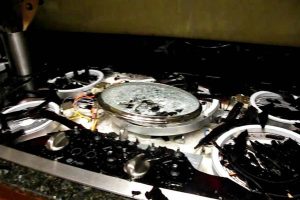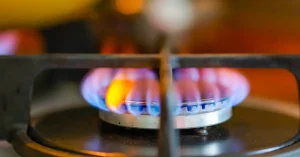Updated on March 9, 2023
One popular device in most houses is the gas stove, yet many people are afraid to use it for fear of an explosion. It’s possible they have a point, but it’s incredibly rare.
Gas stoves are generally safe appliances, but everyone who owns one should be aware of what could cause them to explode. “What causes a gas stove to explode?” is the question we’ll answer today.
In this post, we’ll go through some of the most prevalent causes of gas stove explosions and offer some prevention advice.
Why Does My Stove Keep Exploding
An electric stove can explode for the following reasons: Electric sparks can be generated by faulty connections, which can lead to an explosion. Eventually, this can lead to a buildup of heat and an explosion as a result of reduced airflow.

How Common Is It for a Stove to Explode?
Fortunately, stove explosions are quite rare occurrences. It’s impossible to know how many electric stoves have blown up because no research has been done on it. This makes it more difficult to investigate, but it also indicates that the issue has not generated enough interest to warrant further investigation.
However, injuries caused by stoves have been studied. Each year, over 43,000 people suffer injuries as a result of stove-related mishaps, according to research published in the American Journal of Emergency Medicine. However, burns accounted for roughly half of all injuries.
There is a risk of serious damage if a stove explodes. It has been found that the most common cause of stove-related injuries is burns to the hands caused by touching a hot stovetop.
Types of Electric Stove Tops and How They Work
- Coil Burners – On older stoves, these burners are commonplace. Cast iron cylindrical coils make up the structure. It is most likely that sparks or explosions will be caused by the burners.
- Glass Cooktop – This type of cooktop uses a narrow ribbon element encased in an insulating substance and put under a ceramic glass surface. This type of cooktop is commonly found in contemporary appliances. It’s advantageous because it’s easier to maintain.
Why Does the Stove Explode
Overheating burners
There are times when your stove can explode because of an overheated equipment.
Most Common Causes of An Electric Stove Explosion:
Loose connections: An explosion can be caused by electrical sparks caused by loose connections.
Dust buildup: This can lead to a buildup of heat and an explosion if the airflow to the coil range element is reduced. The coil tops of electric stoves must always be thoroughly cleaned to remove any traces of dirt or grease.
Damaged socket: An electric stove explosion might be caused if the plug and socket are broken.
Turn off your electric range immediately if you see any sparks emanating from the plug and cable connections.
How Often Do Gas Stoves Explode?
Despite the fact that gas stove explosions are relatively uncommon, they do happen. The National Fire Protection Association (NFPA) published a research in 2018 estimating that 4,200 home fires start each year because of natural gas ignition.
According to the research, these are responsible for 40 deaths on average each year.
According to the report, local fire departments in the United States respond to an average of 340 natural gas or Liquefied Petroleum Gas leaks per day without igniting.
Precautions to Prevent a Gas Stove Explosion
Gas stove explosions can be prevented with a few simple precautions. If you want to avoid gas stove explosions, here are some things you may do:
- A gas leak detector should be installed near your stove. When a gas leak is detected early enough, it can be contained with a carbon monoxide alarm.
- Ensure that your burners are kept at least a foot away from any flammable materials when in use. There are a variety of devices that can be dangerous, including electrical appliances such as microwaves, ovens, and refrigerators.
- Check for corrosion, rust, and other damage on a regular basis to make sure there aren’t any gas leaks.
- Do not clean the stove with combustible liquid.
- Never leave a pan on a burner unattended, even if the temperature is set to low.
- The venting system of a gas appliance should not be installed in an area with a lot of flammable material, such as dust, dirt or other debris.
- To keep the surface of your gas stove in good condition, you should clean it often. On the basis of how frequently it is used, you should clean your stove. The more frequently an appliance is used, the more frequently it needs to be cleaned.
- Do not conceal the gas stove’s exhaust pipe, which should be routed to the exterior of your house. Natural gas appliances should be vented outside when they’re installed so that any emissions don’t become trapped within your home.
- Prior to turning in for the night or leaving the house, make sure your gas stove is completely off.
- Your gas stove will run more smoothly if it is serviced on a regular basis.
How Dangerous Are Gas Stoves?

Gas stoves are generally considered to be safe. Homes with gas stoves are more popular, and gas is favoured by chefs all over the world for its fast and even heating.
Only about 17 Americans per year are killed by natural gas alone in the United States.
As a result of indoor air pollution from cooking, the World Health Organization estimates that 4 million people around the world die prematurely each year.
In excessive amounts, nitrogen dioxide, a byproduct of gas stoves, can be detrimental to the user’s health. According to the Rocky Mountain Institute, pollution from gas stoves is a significant threat to public health.
Gas stoves are generally considered to be safe. Chefs throughout the world prefer cooking on gas burners because they are faster and more consistent than electric stoves.
Only 17 people are killed each year in the United States because to natural gas.
As a result of indoor air pollution from cooking, the World Health Organization estimates that 4 million people around the world die prematurely each year.
Nitrogen dioxide, a toxic gas produced by gas burners, can be dangerous in large doses. According to the Rocky Mountain Institute, pollution from gas stoves is a significant threat to public health.
In addition, natural gas line ruptures cause explosions that injure scores of people each year in the United States alone.
A gas stove can be harmful if basic safety precautions are not taken, just like anything else. If you leave a gas stove on all night or don’t properly maintain it, it might become dangerous.
We’ll go over all the possible triggers for an explosion in a gas stove in the section below.

